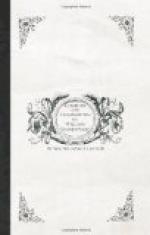Master Silas did interrupt this discourse, by saying, —
“May it please your worship, the constable is waiting.”
Whereat Sir Thomas said, tartly, —
“And let him wait.” {55a}
Then to me, —
“I hope we have done with verses, and are not to be befooled by the lad’s nonsense touching mermaids or worse creatures.”
Then to Will, —
“William Shakspeare! we live in a Christian land, a land of great toleration and forbearance. Three score cartsful of fagots a year are fully sufficient to clear our English air from every pestilence of heresy and witchcraft. It hath not alway been so, God wot! Innocent and guilty took their turns before the fire, like geese and capons. The spit was never cold; the cook’s sleeve was ever above the elbow. Countrymen came down from distant villages into towns and cities, to see perverters whom they had never heard of, and to learn the righteousness of hatred. When heretics waxed fewer the religious began to grumble that God, in losing his enemies, had also lost his avengers.
“Do not thou, William Shakspeare, dig the hole for thy own stake. If thou canst not make men wise, do not make them merry at thy cost. We are not to be paganised any more. Having struck from our calendars, and unnailed from our chapels, many dozens of decent saints, with as little compunction and remorse as unlucky lads throw frog-spawn and tadpoles out of stagnant ditches, never let us think of bringing back among us the daintier divinities they ousted. All these are the devil’s imps, beautiful as they appear in what we falsely call works of genius, which really and truly are the devil’s own,—statues more graceful than humanity, pictures more living than life, eloquence that raised single cities above empires, poor men above kings. If these are not Satan’s works, where are they? I will tell thee where they are likewise. In holding vain converse with false gods. The utmost we can allow in propriety is to call a knight Phoebus, and a dame Diana. They are not meat for every trencher.
“We must now proceed straightforward with the business on which thou comest before us. What further sayest thou, witness?”
Euseby Treen.
“His face was toward me; I saw it clearly. The graver man followed him into the punt, and said, roughly, ’We shall get hanged as sure as thou pipest.’
“Whereunto he answered, —
’Naturally, as fall upon the ground
The leaves in winter and the girls in spring.’
And then began he again with the mermaid; whereat the graver man clapped a hand before his mouth, and swore he should take her in wedlock, to have and to hold, if he sang another stave. ’And thou shalt be her pretty little bridemaid,’ quoth he gaily to the graver man, chucking him under the chin.”
Sir Thomas.
“And what did Carnaby say unto thee, or what didst thou say unto Carnaby?”




